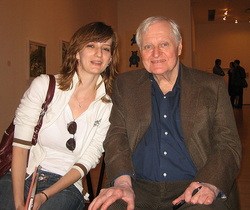John Ashbery (July 28, 1927 - October 18, 2012)
|
John Ashbery is recognized as one of the greatest twentieth-century American poets. He has won nearly every major American award for poetry, including the Pulitzer Prize, the National Book Award, the Yale Younger Poets Prize, the Bollingen Prize, the Ruth Lilly Poetry Prize, the Griffin International Award, and a MacArthur “Genius” Grant.
In more recent Ashbery works, such as Girls on the Run (1999), Chinese Whispers(2002), Where Shall I Wander? (2005) and A Worldly Country (2007), critics have noted an infusion of elegy as the poet contemplates aging and death. Leave the Hand In Furthermore, Mr. Tuttle used to have to run in the streets. Now, each time friendship happens, they’re fully booked. Sporting with amaryllis in the shade is all fine and good, but when your sparring partner gets there first you wonder if it was all worth it. “Yes, why do it?” I’m on hold. It will take quite a lot for this music to grow on me. I meant no harm. I’ve helped him from getting stuck before. Dumb thing. All my appetites are friendly. Children too are free to go and come as they please. I ask you only to choose between us, then shut down this election. But don’t reveal too much of your hand at any given time. Then up and pipes the major, leave the hand in, or change the vows. The bold, enduring menace of courtship is upon us like the plague, and none of us can say what trouble will be precipitated once it has had its way with us. Our home is marshland. After dinner was wraparound. You got a tender little look at it. Outside, it never did turn golden. JOHN ASHBERY |
Mary Oliver (born September 10, 1935- October 13 2012)

Mary Oliver (born September 10, 1935 - October 13, 2012) is an American poet who has won the National Book Award and the Pulitzer Prize. The New York Times described her as "far and away, [America's] best-selling poet".[1]
Love Sorrow
Love sorrow. She is yours now, and you must
take care of what has been
given. Brush her hair, help her
into her little coat, hold her hand,
especially when crossing a street. For, think,
what if you should lose her? Then you would be
sorrow yourself; her drawn face, her sleeplessness
would be yours. Take care, touch
her forehead that she feel herself not so
utterly alone. And smile, that she does not
altogether forget the world before the lesson.
Have patience in abundance. And do not
ever lie or ever leave her even for a moment
by herself, which is to say, possibly, again,
abandoned. She is strange, mute, difficult,
sometimes unmanageable but, remember, she is a child.
And amazing things can happen. And you may see,
as the two of you go
walking together in the morning light, how
little by little she relaxes; she looks about her;
she begins to grow.
Mary Oliver
Love Sorrow
Love sorrow. She is yours now, and you must
take care of what has been
given. Brush her hair, help her
into her little coat, hold her hand,
especially when crossing a street. For, think,
what if you should lose her? Then you would be
sorrow yourself; her drawn face, her sleeplessness
would be yours. Take care, touch
her forehead that she feel herself not so
utterly alone. And smile, that she does not
altogether forget the world before the lesson.
Have patience in abundance. And do not
ever lie or ever leave her even for a moment
by herself, which is to say, possibly, again,
abandoned. She is strange, mute, difficult,
sometimes unmanageable but, remember, she is a child.
And amazing things can happen. And you may see,
as the two of you go
walking together in the morning light, how
little by little she relaxes; she looks about her;
she begins to grow.
Mary Oliver
Dušan "Charles" Simić 9 May 1938 - 12 October 2012

Dušan "Charles" Simić (Serbian: Душан "Чарлс" Симић [dǔʃan tʃârls sǐːmitɕ]; born 9 May 1938- died 12 October 2012) is a Serbian-American poet and was co-poetry editor of the Paris Review. He was appointed the fifteenth Poet Laureate Consultant in Poetry to the Library of Congressin 2007.[1]
Eyes Fastened with Pins
BY CHARLES SIMIC
How much death works,
No one knows what a long
Day he puts in. The little
Wife always alone
Ironing death’s laundry.
The beautiful daughters
Setting death’s supper table.
The neighbors playing
Pinochle in the backyard
Or just sitting on the steps
Drinking beer. Death,
Meanwhile, in a strange
Part of town looking for
Someone with a bad cough,
But the address is somehow wrong,
Even death can’t figure it out
Among all the locked doors ...
And the rain beginning to fall.
Long windy night ahead.
Death with not even a newspaper
To cover his head, not even
A dime to call the one pining away,
Undressing slowly, sleepily,
And stretching naked
On death’s side of the bed.
Charles Simic, “Eyes Fastened with Pins” from Charles Simic: Selected Early Poems. Copyright © 1999 by Charles Simic. Reprinted with the permission of George Braziller, Inc.
Source: Charles Simic: Selected Early Poems (George Braziller Inc., 1999)
Eyes Fastened with Pins
BY CHARLES SIMIC
How much death works,
No one knows what a long
Day he puts in. The little
Wife always alone
Ironing death’s laundry.
The beautiful daughters
Setting death’s supper table.
The neighbors playing
Pinochle in the backyard
Or just sitting on the steps
Drinking beer. Death,
Meanwhile, in a strange
Part of town looking for
Someone with a bad cough,
But the address is somehow wrong,
Even death can’t figure it out
Among all the locked doors ...
And the rain beginning to fall.
Long windy night ahead.
Death with not even a newspaper
To cover his head, not even
A dime to call the one pining away,
Undressing slowly, sleepily,
And stretching naked
On death’s side of the bed.
Charles Simic, “Eyes Fastened with Pins” from Charles Simic: Selected Early Poems. Copyright © 1999 by Charles Simic. Reprinted with the permission of George Braziller, Inc.
Source: Charles Simic: Selected Early Poems (George Braziller Inc., 1999)


